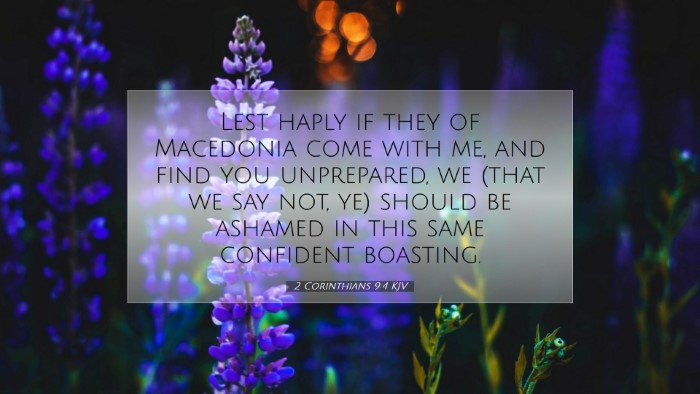Old Testament
Genesis Exodus Leviticus Numbers Deuteronomy Joshua Judges Ruth 1 Samuel 2 Samuel 1 Kings 2 Kings 1 Chronicles 2 Chronicles Ezra Nehemiah Esther Job Psalms Proverbs Ecclesiastes Song of Solomon Isaiah Jeremiah Lamentations Ezekiel Daniel Hosea Joel Amos Obadiah Jonah Micah Nahum Habakkuk Zephaniah Haggai Zechariah Malachi2 Corinthians 9:4
2 Corinthians 9:4 KJV
Lest haply if they of Macedonia come with me, and find you unprepared, we (that we say not, ye) should be ashamed in this same confident boasting.
2 Corinthians 9:4 Bible Commentary
Commentary on 2 Corinthians 9:4
Bible Verse (2 Corinthians 9:4): "Lest haply if they of Macedonia come with me and find you unprepared, we (that we say not, ye) should be ashamed in this same confident boasting."
Introduction
This verse is part of Paul's broader discussion on the ministry of giving and the importance of preparation regarding the collection for the saints in Jerusalem. In this passage, Paul expresses his concern for the Corinthians and emphasizes the need for them to be ready for the arrival of the Macedonian believers, who will travel with him to gather the contributions. This commentary draws from several public domain sources to provide a comprehensive understanding of this verse.
Contextual Analysis
Understanding the context of Paul's letters to the Corinthians is crucial. The Corinthians were wealthy and had been requested by Paul to contribute to the impoverished saints in Jerusalem. Paul uses the Macedonian churches as an example of generosity despite their own poverty.
Paul's concern in this verse includes both the spiritual and social dimensions of giving. He highlights the anticipation of a visit and the potential embarrassment that could arise if the Corinthians are unprepared. This situation reflects a deeper principle in Christian stewardship and witness.
Insights from Commentators
-
Matthew Henry's Commentary
Matthew Henry emphasizes the integrity of the Christian community. He notes that Paul's anxiety about the Corinthians’ preparedness stems from a desire to avoid shame not just for himself, but for the entire church. He views this as a critical moment of accountability for the Corinthians to demonstrate their commitment to the faith through their generosity.
-
Albert Barnes' Notes on the Bible
Albert Barnes underscores the intent behind Paul’s letter, highlighting that preparation in giving is vital to avoid disappointment. He points out that the term "unprepared" serves as a warning for the Corinthians to reflect on their readiness to contribute. Barnes elaborates that this preparation isn't merely financial but also spiritual, signaling a heart aligned with the Gospel’s call to generosity.
-
Adam Clarke's Commentary
Adam Clarke approaches this passage with an emphasis on the social dynamics at play. He notes that the juxtaposition of the wealthy Corinthians and the Macedonians, who gave out of their poverty, serves a dual purpose: it challenges the Corinthians to rise to the occasion and illustrates the principle that giving is tied directly to the abundance of one’s heart rather than the abundance of one’s resources.
Theological Reflections
The theological implications of 2 Corinthians 9:4 extend beyond the immediate context of giving. The potential for shame in being unprepared resonates with the larger biblical themes of readiness and accountability. Believers are called to be stewards of their resources, and this verse invites reflection on the nature of our generosity as a reflection of our spiritual health.
Furthermore, the emphasis on collective responsibility suggests a community that thrives on mutual support and accountability. Paul’s concern for his fellow believers demonstrates the interconnectedness of the Body of Christ and the importance of each member in contributing to the overall mission of the church.
Practical Application
For pastors, students, and theologians, this verse can serve as a foundational text for discussions on stewardship within the church. Here are a few practical applications:
- Preparation for Generosity: Encourage congregations to prepare not only their finances but their hearts for giving. This involves prayer, seeking God's guidance, and understanding the needs of the community.
- Building a Culture of Accountability: Foster an environment where church members can support one another in their commitments to give, thus aligning with Paul's intent of mutual encouragement and preparation.
- Model Generosity: Leaders should model the behavior they wish to see. By being open about their own struggles and triumphs in generosity, they can inspire others to follow suit.
Conclusion
2 Corinthians 9:4 serves as a powerful reminder of the importance of readiness in all aspects of the Christian life, particularly in giving. By learning from Paul’s admonition, believers can cultivate a spirit of generosity that reflects the heart of the Gospel. The insights gathered from various public domain commentaries highlight the richness of this text and its relevance for guiding the church today.


